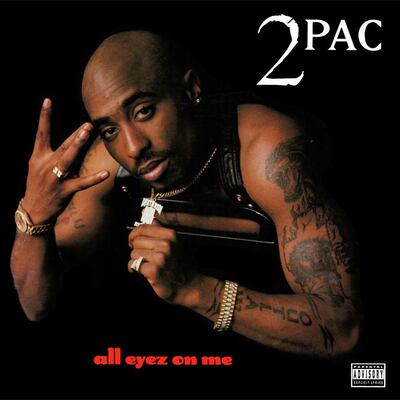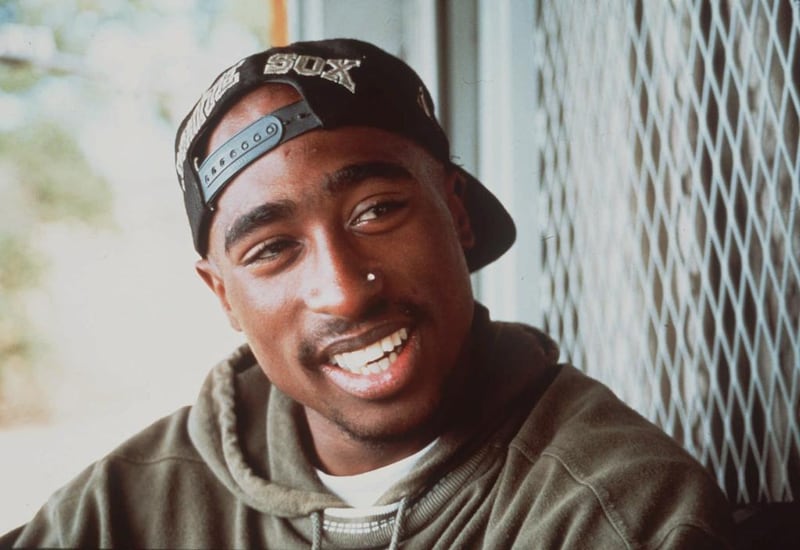The first album I ever bought, at the unknowing age of 15, was Tupac's All Eyez On Me.
More than 20 years later, it remains seminal, and I can still recount almost every word on the two-disc, 27-song compilation. Those original CDs are long gone – scratched, misplaced and replaced on myriad occasions. But there has been no point over the past two decades when I have not had that album in my possession. I will accept that it is somewhat ridiculous for a grown woman to be singing along to Shorty Wanna Be a Thug on her morning commute, but so be it.
The golden age of hip-hop
Like many people slightly out of touch with contemporary culture, I look back at the 1990s as the golden age of hip-hop. Pac, Biggie, Snoop, Jay-Z, Dr Dre, Cypress Hill and LL Cool J offered up a soundtrack for my formative years – creating a snapshot of a world that couldn’t be further from my own sheltered middle-class existence in Limassol, Cyprus.
Warren G's Regulate, TLC's Creep and Bone Thugs-N-Harmony's Crossroads were played on repeat. I was transfixed by Snoop Dogg's lazy drawl, LL's slick crooning, Salt-N-Peppa's irreverence and the way that Tupac could be fun and fearless and fatalistic all at once.

For me, hip-hop presented searing social commentary interwoven with masterful word play and a healthy dose of humour. From Notorious BIG's Juicy to Tupac's Life Goes On, the songs artfully charted the realities, social injustices and very specific struggles of an entire community; they gave voice to issues that I didn't even know existed.
The dilemma
Yes, it could be violent and vulgar and unapologetically offensive, but it was also raw and honest. It was poetry, even if I did sometimes wince at the specifics. I studied English literature at university and, to me, the rhymes of Tupac and his contemporaries were no less worthy, evocative or powerful than those of William Wordsworth or Ted Hughes – they just had a better bassline. For my dissertation, I explored the poetry of the Harlem Renaissance, the artistic, social and cultural movement that unfolded in New York in the 1920s. In my eyes, hip-hop was just a contemporary continuation of that tradition.
The problem is, I also unequivocally and unashamedly consider myself to be a feminist, which gives rise to a mini existentialist crisis. In a week when Chris Brown was arrested on rape charges in Paris, and the fallout from the Lifetime docu-series Surviving R Kelly continues, is it possible to disconnect my feminist values from a genre of music that has long been blamed for perpetuating misogyny? R Kelly's R album was a regular feature during my university years, but is now entirely tainted. Can I really, in good conscience, listen to the music of Chris Brown, who at best likes to beat women and at worse, rape them? As American filmmaker Ava DuVernay stated in a 2015 tweet: "To be a woman who loves hip-hop at times is to be in love with your abuser."
I do feel like the issue has been heightened by the current brand of hyper commercialised hip-hop – which is showy, self-congratulatory, lazily inflammatory and an ongoing ode to consumerism. But is pop or rock or reality TV any better? At this point, I feel like if I tried to reject all forms of popular culture that objectified and hyper-sexualised women, I’d have to spend my time sitting in a dark room in silence.
Hip-hop is now an ingrained part of me
Also, to write hip-hop off as entirely misogynistic is to ignore the work of female rappers who have long challenged the status quo, like Missy Elliott, TLC and Queen Latifah, particularly in the case of her feminist anthem Unity. It also ignores the pro-female attitudes expressed in many songs, not least Tupac's Keep Your Head Up and Brenda's Got a Baby, and the more enlightened attitudes of "conscious rappers" such as Kendrick Lamar. Even the most old-school of the OGs have openly recanted some of their worst offences – Snoop Dogg claimed in a 2015 interview that his attitudes to woman have changed and that he just didn't know any better at the time, while Jay-Z has expressed regret about the lyrics of his hit single Big Pimpin'.
I wonder whether it is possible, or even fruitful, to try to intellectualise one's response to music, which is primal, deeply emotional and rooted in memories. Tupac struck a chord when I was 15; I have since danced to California Love on hundreds of happy occasions; on the night that I scaled Kilimanjaro, I listened to All Eyez on Me on loop to keep myself going. Whether I like it or not, hip-hop is now an ingrained part of my experiences.
Like other areas of popular culture, I can only imagine that hip-hop will find itself with a lot of growing up to do in a post #MeToo, post Bill Cosby / Harvey Weinstein / R Kelly era. There will be more female artists bringing an alternative, female-centric view to the genre, and more artists like Snoop Dogg who start to see the errors of their past ways. Until then, perhaps I will have to make peace with the fact that, deep down, maybe I am a hip-hop hypocrite.
________________________
Read more of Selina's thoughts:
Take it from a nicotine addict, shisha is no joke
UAE expat view: How being home for the holidays is like travelling back in time
When a terror attack hits too close to home
From Dubai to Abu Dhabi: some lessons learnt on a long commute
________________________






